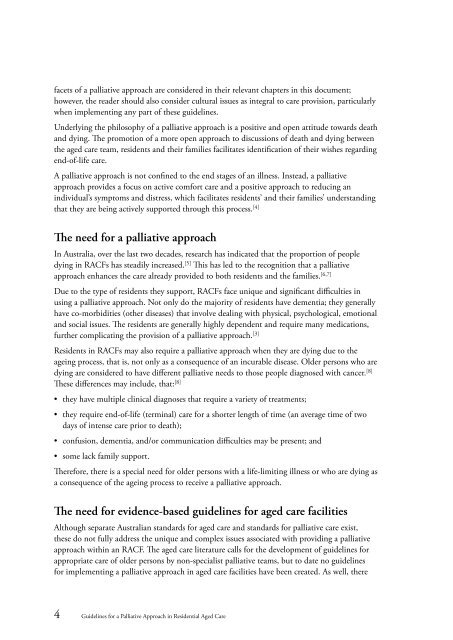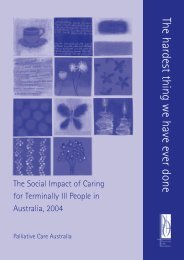Guidelines for a Palliative Approach in Residential Aged Care
Guidelines for a Palliative Approach in Residential Aged Care
Guidelines for a Palliative Approach in Residential Aged Care
Create successful ePaper yourself
Turn your PDF publications into a flip-book with our unique Google optimized e-Paper software.
facets of a palliative approach are considered <strong>in</strong> their relevant chapters <strong>in</strong> this document;<br />
however, the reader should also consider cultural issues as <strong>in</strong>tegral to care provision, particularly<br />
when implement<strong>in</strong>g any part of these guidel<strong>in</strong>es.<br />
Underly<strong>in</strong>g the philosophy of a palliative approach is a positive and open attitude towards death<br />
and dy<strong>in</strong>g. The promotion of a more open approach to discussions of death and dy<strong>in</strong>g between<br />
the aged care team, residents and their families facilitates identification of their wishes regard<strong>in</strong>g<br />
end-of-life care.<br />
A palliative approach is not conf<strong>in</strong>ed to the end stages of an illness. Instead, a palliative<br />
approach provides a focus on active com<strong>for</strong>t care and a positive approach to reduc<strong>in</strong>g an<br />
<strong>in</strong>dividual’s symptoms and distress, which facilitates residents’ and their families’ understand<strong>in</strong>g<br />
that they are be<strong>in</strong>g actively supported through this process. [4]<br />
The need <strong>for</strong> a palliative approach<br />
In Australia, over the last two decades, research has <strong>in</strong>dicated that the proportion of people<br />
dy<strong>in</strong>g <strong>in</strong> RACFs has steadily <strong>in</strong>creased. [5] This has led to the recognition that a palliative<br />
approach enhances the care already provided to both residents and the families. [6,7]<br />
Due to the type of residents they support, RACFs face unique and significant difficulties <strong>in</strong><br />
us<strong>in</strong>g a palliative approach. Not only do the majority of residents have dementia; they generally<br />
have co-morbidities (other diseases) that <strong>in</strong>volve deal<strong>in</strong>g with physical, psychological, emotional<br />
and social issues. The residents are generally highly dependent and require many medications,<br />
further complicat<strong>in</strong>g the provision of a palliative approach. [3]<br />
Residents <strong>in</strong> RACFs may also require a palliative approach when they are dy<strong>in</strong>g due to the<br />
age<strong>in</strong>g process, that is, not only as a consequence of an <strong>in</strong>curable disease. Older persons who are<br />
dy<strong>in</strong>g are considered to have different palliative needs to those people diagnosed with cancer. [8]<br />
These differences may <strong>in</strong>clude, that: [8]<br />
• they have multiple cl<strong>in</strong>ical diagnoses that require a variety of treatments;<br />
• they require end-of-life (term<strong>in</strong>al) care <strong>for</strong> a shorter length of time (an average time of two<br />
days of <strong>in</strong>tense care prior to death);<br />
• confusion, dementia, and/or communication difficulties may be present; and<br />
• some lack family support.<br />
There<strong>for</strong>e, there is a special need <strong>for</strong> older persons with a life-limit<strong>in</strong>g illness or who are dy<strong>in</strong>g as<br />
a consequence of the age<strong>in</strong>g process to receive a palliative approach.<br />
The need <strong>for</strong> evidence-based guidel<strong>in</strong>es <strong>for</strong> aged care facilities<br />
Although separate Australian standards <strong>for</strong> aged care and standards <strong>for</strong> palliative care exist,<br />
these do not fully address the unique and complex issues associated with provid<strong>in</strong>g a palliative<br />
approach with<strong>in</strong> an RACF. The aged care literature calls <strong>for</strong> the development of guidel<strong>in</strong>es <strong>for</strong><br />
appropriate care of older persons by non-specialist palliative teams, but to date no guidel<strong>in</strong>es<br />
<strong>for</strong> implement<strong>in</strong>g a palliative approach <strong>in</strong> aged care facilities have been created. As well, there<br />
<br />
<strong>Guidel<strong>in</strong>es</strong> <strong>for</strong> a <strong>Palliative</strong> <strong>Approach</strong> <strong>in</strong> <strong>Residential</strong> <strong>Aged</strong> <strong>Care</strong>
















